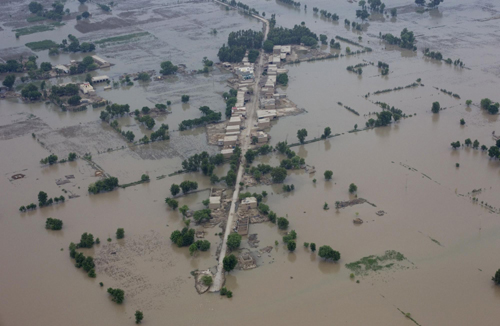Asia-Pacific
UN chief flies in to Pakistan as crisis worsens
(Agencies)
Updated: 2010-08-15 15:07
 |
Large Medium Small |
SUKKUR, Pakistan - UN Secretary-General Ban Ki-moon travelled to flood-ravaged Pakistan on Sunday to boost relief efforts as concerns grew about the 20 million people made homeless in one of the worst disasters to hit the country.
 An aerial view of flood waters is seen over Pakistan's Rajanpur district in Punjab province on August 14, 2010. [Agencies] |
Authorities said more flood surges were coursing down the River Indus and other waterways in southern Sindh province and were expected to peak later Sunday, causing fresh deluges. The river, which in better times irrigates the crops of millions of farmers, is 15 miles (25 kilometres) wide at some points — 25 times wider than during normal monsoon seasons.
| ||||
About 1,500 people have died in the disaster and more than 7.9 million acres (3.2 million hectares) of cotton, sugar cane and wheat crops destroyed. The International Monetary Fund has warned of dire economic consequences in a country already reliant on foreign aid to keep its economy afloat and one key to the US-led war against al-Qaida and the Taliban.
"The whole of Sindh is drowning," said Ghulam Sarwar, who was living in a tent on the edge of the city of Sukkur after fleeing is home along with his wife and eight children. "We do not know how long we will have to suffer."
UN chief Ban was to visit flood-devastated areas Sunday and meet with government officials, a spokesman said.
The United States has so far donated the most to the relief effort, at least $70 million, and has sent military helicopters to rescue stranded people and drop off food and water. Washington hopes the assistance will support a pivotal regional ally and help improve its image in the country — however marginally — as it seeks its support in the battle against militancy,
"So far, if anyone has practically given us maximum help, it is America," Prime Minister Yousuf Raza Gilani said when a Pakistani reporter suggested the US has done little since the crisis started.
Two additional US Navy MH-53E Sea Dragon helicopters arrived in Pakistan on Saturday to support flood relief efforts, the US State Department said. That brings to seven the total number of aircraft in Pakistan from the USS Peleliu, which is positioned in international waters in the Arabian Sea.
In the northwest of the country, US missiles killed 12 people Saturday in a Pakistani tribal region filled with Islamist insurgents bent on pushing Western troops out of neighbouring Afghanistan. The strike was the first in several weeks.
The Pakistani government's reputation — already shaky to begin with — has suffered during the crisis, especially after the president decided to visit Europe as the crisis was unfolding. President Asif Ali Zardari has tried to make up for that public relations gaffe by meeting with flood victims in hard-hit areas since returning.
"We are with you. Pakistan is with you, and the people of Pakistan are with you," he told survivors at a relief camp in the northwest's Nowshera city Saturday. He promised the government would rebuild victims' homes.



